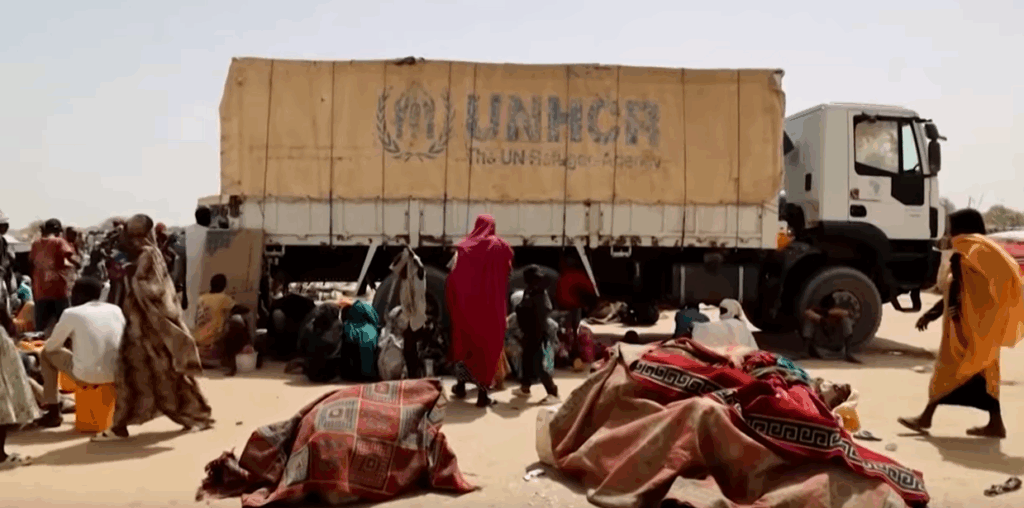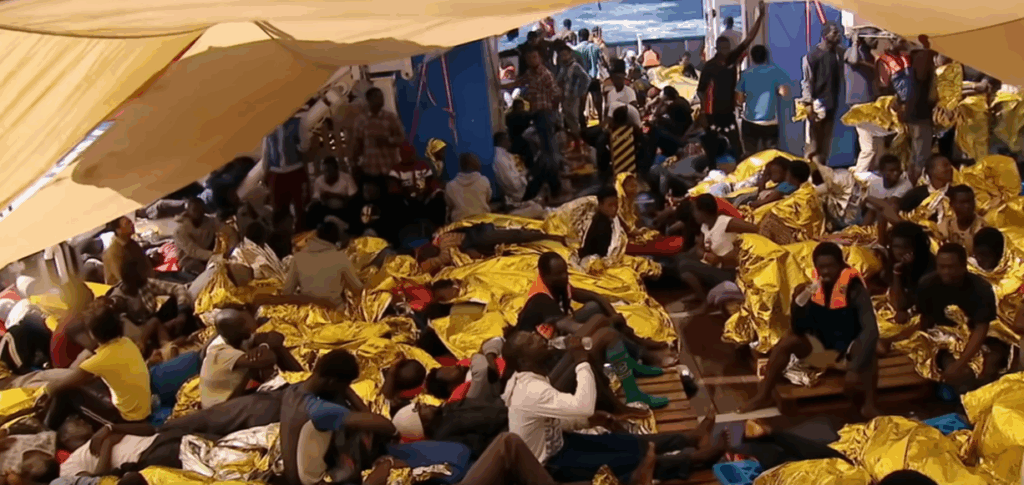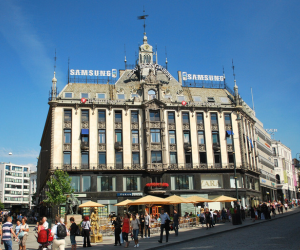Displacement And The Global Problem Of Refugees And “Stateless Persons”
By David Gallup Photos: YouTube Screenshots More than 120 million people have been displaced from their homes due to war, climate change, political instability, and oppression in the past few years, a figure that has doubled in the last decade. Millions more are living in vulnerable situations as stateless individuals, frequently unable to exercise even their most basic rights. The population of displaced persons is larger than that of more than 220 countries and dependent territories. In other words, only 12 countries in the world have a population larger than 120 million people. As the UN High Commissioner for Refugees explains, “one out of every 67 people on the Earth” is displaced from their homes. More than “20 people are forced to flee every minute of every day” according to the International Rescue Committee. These figures do not even account for the day-to-day oppression that millions, if not billions, face but who are unable or reluctant to leave to seek a safe haven. Most refugees in the world are either internally displaced in or are fleeing from the following countries: Afghanistan, Democratic Republic of Congo, Haiti, Myanmar, Palestine, Somalia, South Sudan, Sudan, Syria, Ukraine, Venezuela, and Yemen. As violence, war, and climate destruction affect more countries and regions of the world, the growing numbers of refugees and migrants could put a strain on social systems. National governments have responded to immigration flows in different ways, some limiting immigrants from entering their claimed territories and others welcoming newcomers. Just five countries — Iran, Turkey, Colombia, Germany, and Uganda — have welcomed almost 40% of the world’s refugees and others fleeing persecution and war. The nation-state system has created the “refugee” and “stateless person,” as well as the severe problems associated with being considered outside the law or without “legal” status. All human beings are legal and have rights that should be respected wherever they live. Yet, due to violations of their human rights frequently perpetuated by or ignored by national governments, thousands of people flee their homes and countries every day trying to find safety, stability, and asylum. By dividing up the world into 200 or so different countries, we have created “in” and “out” groups, with some achieving dignity, acceptance, inclusion, and rights fulfillment, and others being treated as less than human, unable to meet their basic daily needs. This disparity of treatment destabilizes society. Why should our fellow humans have to flee to have their rights and basic needs upheld? Why are millions stuck in refugee camps with inadequate food, housing, healthcare, education, and opportunity? To have the kind of world in which the rights reaffirmed in various declarations and treaties such as the Universal Declaration of Human Rights, the International Covenant on Civil and Political Rights, and the International Covenant on Economic, Social, and Cultural Rights are fully met, we should all be able to claim, and then exercise, our rights no matter where we happen to live on the planet. Human rights and duties are not bound by territory; they are not dependent upon the nation-state in which one happens to be born or where one happens to live. Human rights are innate and unalienable; we are born with them, and we cannot give them up. We have them simply by being human. What if we were to claim a citizenship that inherently affirms our rights wherever we find ourselves on planet Earth? If everyone had citizenship everywhere, statelessness would no longer exist, and only natural disasters would forcibly displace people. With world citizenship, if we do not like where we live, if we do not like the politics or the rulers, then we could choose to live somewhere else, rather than being forced to flee for our safety and livelihood. World citizenship, as a valid and legal citizenship beyond any other status that someone may carry, would ensure that everyone has at least one citizenship which, in its inclusiveness, upholds our concomitant rights and duties. Requiring all governments to respect world citizenship status legally is the next step – a step that will support millions of displaced persons, by ensuring that governments will begin to fulfill their obligations to respect refugees, stateless and displaced persons’ innate and unalienable rights. To promote respect for this highest citizenship status, global institutions of law, such as a World Court of Human Rights and a World Parliament of the people, must be established. World citizenship, as the highest level of allegiance, empowers us to focus on equity, justice, sustainability, unity, and harmony with each other and the Earth. As long as we, the people of the world, allow the nation-state system to maintain the arbitrary and exclusive borders that divide humans from one another, immigration will continue to be view

By David Gallup
Photos: YouTube Screenshots
More than 120 million people have been displaced from their homes due to war, climate change, political instability, and oppression in the past few years, a figure that has doubled in the last decade. Millions more are living in vulnerable situations as stateless individuals, frequently unable to exercise even their most basic rights.

The population of displaced persons is larger than that of more than 220 countries and dependent territories. In other words, only 12 countries in the world have a population larger than 120 million people. As the UN High Commissioner for Refugees explains, “one out of every 67 people on the Earth” is displaced from their homes. More than “20 people are forced to flee every minute of every day” according to the International Rescue Committee. These figures do not even account for the day-to-day oppression that millions, if not billions, face but who are unable or reluctant to leave to seek a safe haven.
Most refugees in the world are either internally displaced in or are fleeing from the following countries: Afghanistan, Democratic Republic of Congo, Haiti, Myanmar, Palestine, Somalia, South Sudan, Sudan, Syria, Ukraine, Venezuela, and Yemen.
As violence, war, and climate destruction affect more countries and regions of the world, the growing numbers of refugees and migrants could put a strain on social systems. National governments have responded to immigration flows in different ways, some limiting immigrants from entering their claimed territories and others welcoming newcomers. Just five countries — Iran, Turkey, Colombia, Germany, and Uganda — have welcomed almost 40% of the world’s refugees and others fleeing persecution and war.
The nation-state system has created the “refugee” and “stateless person,” as well as the severe problems associated with being considered outside the law or without “legal” status. All human beings are legal and have rights that should be respected wherever they live. Yet, due to violations of their human rights frequently perpetuated by or ignored by national governments, thousands of people flee their homes and countries every day trying to find safety, stability, and asylum.
By dividing up the world into 200 or so different countries, we have created “in” and “out” groups, with some achieving dignity, acceptance, inclusion, and rights fulfillment, and others being treated as less than human, unable to meet their basic daily needs. This disparity of treatment destabilizes society.
Why should our fellow humans have to flee to have their rights and basic needs upheld? Why are millions stuck in refugee camps with inadequate food, housing, healthcare, education, and opportunity?
To have the kind of world in which the rights reaffirmed in various declarations and treaties such as the Universal Declaration of Human Rights, the International Covenant on Civil and Political Rights, and the International Covenant on Economic, Social, and Cultural Rights are fully met, we should all be able to claim, and then exercise, our rights no matter where we happen to live on the planet. Human rights and duties are not bound by territory; they are not dependent upon the nation-state in which one happens to be born or where one happens to live.
Human rights are innate and unalienable; we are born with them, and we cannot give them up. We have them simply by being human.
What if we were to claim a citizenship that inherently affirms our rights wherever we find ourselves on planet Earth?
If everyone had citizenship everywhere, statelessness would no longer exist, and only natural disasters would forcibly displace people. With world citizenship, if we do not like where we live, if we do not like the politics or the rulers, then we could choose to live somewhere else, rather than being forced to flee for our safety and livelihood.
World citizenship, as a valid and legal citizenship beyond any other status that someone may carry, would ensure that everyone has at least one citizenship which, in its inclusiveness, upholds our concomitant rights and duties.
Requiring all governments to respect world citizenship status legally is the next step – a step that will support millions of displaced persons, by ensuring that governments will begin to fulfill their obligations to respect refugees, stateless and displaced persons’ innate and unalienable rights. To promote respect for this highest citizenship status, global institutions of law, such as a World Court of Human Rights and a World Parliament of the people, must be established.
World citizenship, as the highest level of allegiance, empowers us to focus on equity, justice, sustainability, unity, and harmony with each other and the Earth.
As long as we, the people of the world, allow the nation-state system to maintain the arbitrary and exclusive borders that divide humans from one another, immigration will continue to be viewed as a problem rather than as an educational, economic, political, and social opportunity. When we respect each other, our rights and duties, as world citizens, the entire earth will be a sanctuary of peace and safety for all.

David Gallup is a human rights attorney, President of World Service Authority, Convenor of the World Court of Human Rights Coalition, and a Board Member of Citizens for Global Solutions Education Fund.
To Support our independent investigative journalism contributions are welcome via Cashapp to: $BlackStarNews
Also support Black Star News by buying merch from our brand new Black Star Store!





















